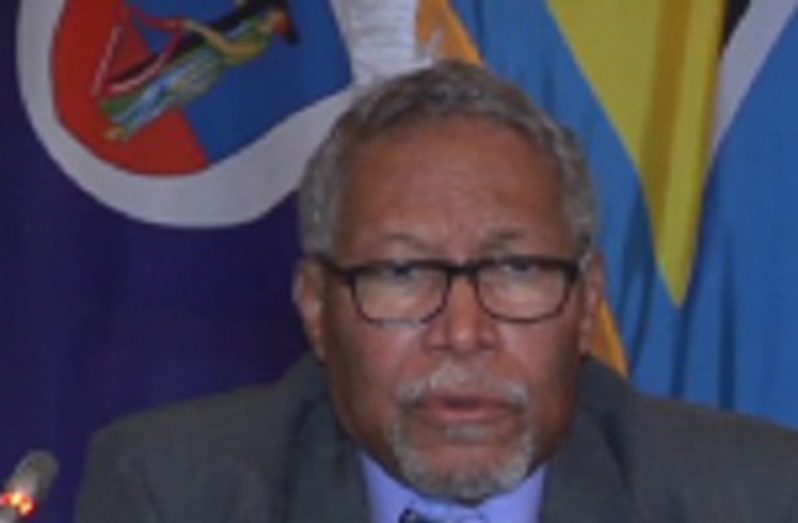The Caribbean Community (CARICOM) Council for Trade and Economic Development (COTED) has ended a weeklong series of meetings in Belize on Friday last on issues ranging from trade, agriculture and fisheries among other matters.
Speaking at the end of the deliberations late Friday, Belize’s Agriculture Minister, Godwin Hulse, who chaired the deliberations, told a news conference that among the main decisions taken at the meeting related to a call by the Caribbean Sugar Association (CSA) for the sustainable future of the sugar industry in the region.
Hulse said that the sugar issue will be further discussed at the next COTED meeting in November with the hope that Belize and other CSA members will be able to get white plantation sugar sold on the CARICOM market. “We came away with three, I thought, very important issues. One was a declaration on sugar, which for Belize is terribly important, which puts it on the agenda for the full COTED sometime in November. It is a matter that the Caribbean producers have been seriously interested in for years to get it on the agenda so some determinations can be made for the way forward for marketing sugar within the region and that is plantation white,” Hulse said.
He said the recommendations from the sugar ministers meeting on Thursday, which was attended principally by the ministers from the producing countries, Belize, Guyana, Barbados, Suriname and Jamaica, will be forward to COTED “because it is a trading issue not a production issue.
“It will be fed into that meeting in November, which hopefully decisions are taken to adopt the recommendations.”
Hulse said the recommendations are basically three; one is to ensure that brown sugar, which is already protected by the Common External Tariff (CET) continues to be protected within the region. “There are some allegations of leakages and we didn’t get into that in detail but it is to ensure that brown sugar continues to be sold in the region because there is really no reason to buy brown sugar from outside the region outside of the price, must pay the duties.
“The other aspect was a monitoring mechanism, some mechanism to be developed to monitor this process and ensure compliance. But the more important one is to ‘include refined white sugar on the commodities list for ineligible conditional duty exemption.”
“It is a long statement, but it simply means it is not an automatic waiver you will need to apply if you wanted to get refined white sugar and that is the issue around which this whole thing turns. The good thing is we got it on this meeting and the issue moves forward now to the COTED meeting in November at which time the ministers there will take a final decision,” Hulse added. He told reporters that another issue discussed during the COTED meeting here was the region’s recommendation on how to approach the African swine fever, a virus that spreads rapidly, is resistant to heat and chemical treatments and can kill large volumes of domestic pigs.
The virus has spread in parts of Asia and Europe, killing more than 50 per cent of the pigs in China. Considering that the virus has a lifespan of more than 25 years, the meeting acknowledged that it poses a risk to small economies like the Caribbean and as a result, the recommendation is for the development of a national plan of action for prevention and early response to the African swine fever, as well as stakeholder engagement and awareness, and other measures to be taken.
“Coming out of the meeting also was a declaration on African swine fever, which is a disease we understand can devastate the pig industry, the pork industry, if it gets in the region. As we understand, it is not yet in the region and definitely not in our sub-region but we have to be very vigilant because it could affect the industry here in Belize,” Hulse said.
“So, there will be specific precautions taken, bio-security measures here in Belize to prevent it from getting into Belize, should it reach the region,” he said, noting “our borders are porous so it is at times difficult but clearly at the official points of entry we can begin to manage this process there”.
Hulse said that there are “some significant studies already in the CARICOM mechanism which we will look at adaption to prevent that from Belize.
“We are very strict in terms of med fly and other quarantine points and we manage them rigidly, so we intend to do that. But it is important that the public hears so that if we have to spray them down at the airport or anywhere they know we have that do that it, they will understand we have to do that to protect our industries and there will be no exception.”
The COTED meeting also discussed and put forward recommendations for the region to monitor the soil fungi that devastates crops like bananas, plantains and related species. The fungi called the Fusarium T.R.-Four can wipe out fields and can remain active in soils for more than 20 years.
“In the case of the race four, which is a banana disease, the implementation has already begun at the farm level where farmers are instituting their own bio-security measures. To make it simple for the listening public, it is spraying down your truck, spraying your shoes, dipping it in whatever solution etc, because it is a soil borne disease making sure you don’ t take it on to the farm. If we can maintain that we can be fairly ok,” Hulse told reporters.













